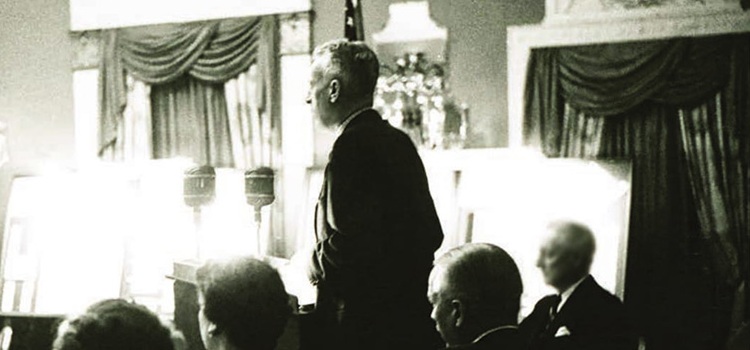A Slice of History: The Responsibility Declaration

Originally published in the in the General Service Office AA newsletter,
Box 459, Winter 2020
By most measures, Alcoholics Anonymous in 1965 had achieved success that seemed beyond the wildest dreams of its two co-founders thirty years earlier. Worldwide membership stood at an estimated 350,000, the Fellowship had become a well-known institution in North America, and many in the recovery field believed that AA was the clearest and best answer for alcoholism. With 10,000 members meeting in Toronto early in July for the fourth International Convention, it seemed a good time to bask in self-congratulation and gloat about AA’s achievements.
The achievements were noted, but the Toronto Convention was also devoted to serious inventory and, especially, the theme of Responsibility. The Responsibility Declaration was formally introduced there by Bill W. It states, “I am Responsible. When anyone, anywhere, reaches out for help, I want the hand of AA always to be there. And for that: I am responsible.”
The author of the pledge was the late Al S., a former trustee of the General Service Board, who told the story behind the saying at the sixth International Convention in Denver in 1975. “A statement (on Responsibility) was wanted that would be emotionally gripping to AAs without imposing any musts,” he recalled. He tried and discarded several approaches before finally arriving at the thought that it should be personal choice and responsibility – “I” instead of “we.” Ten thousand AAs joined hands at the Toronto Convention to repeat the declaration, and it has since been distributed throughout the Fellowship and is reprinted in AA pamphlets and Grapevine.
Why was the declaration written and accepted at that time? A probable reason is that Bill W. and other AA leaders had detected new problems that cast a shadow over AA’s future ability to help alcoholics. In 1963, a national magazine had published a highly critical cover story about AA, suggesting that it was no longer working well. Nonalcoholic professionals in the field were disturbed by the attitudes and actions of some AAs, and one of them would even speak at the Toronto Convention. Some hinted that it was time for AA to “take its inventory.”
Bill W. discussed this issue thoroughly in “Responsibility Is Our Theme,” in the July 1965 Grapevine (The Language of the Heart, p. 328). He noted how we might have alienated people through our arrogant conviction that we were always right and had the only answers to alcoholism. We needed to correct such attitudes and behavior in order to continue reaching the alcoholic who still suffers.
Bill, far from blaming the Fellowship at large, explained how mistakes of his own had often courted disaster. “If I inventory AA’s shortcomings, be also assured that I am also taking stock of my own. I know that my errors of yesterday still have their effect; that my shortcomings of today may likewise affect our future. So it is, with each and all of us.”
For more information about the declaration click here, Responsibility Is Our Theme, an article posted on AA Agnostica in October 2012.

























Most serendipitous this article for me this morning, Roger. My home group in my current hometown, Tucson, AZ, used to say the the Lords Prayer after every single meeting, when I first attended it 20 years ago, just as “How It Works” is read at every single meeting !~!~! Presently, however, since I’ve lived (again) in Tucson for the past year, I’ve only heard it once, for which I am most grateful . . .
Now this IS true progress !~!~!
My home group now sometimes ends with the LP and sometimes the Responsibility statement. It depends on who chairs, and whether I’m in the room – the known atheist.
Some of the AA meetings that I go to close with the responsibility statement rather than a prayer.
I recently wrote an essay for a junior college about AA needing to (at least) provide a secular listing of meetings the same way they provide a list of meetings for men, women, Big Book studies, LGBTQ meetings. It has been well received by many members, religious people as well as atheists and agnostics and many non-alcoholics. I would like to find the proper channels of sending you this paper and possibly have it published in your materials. Please let me know who to send it to if you are interested in reading it.
I’d love to see it, Rich. You can send it to aaagnostica@gmail.com, preferably as a Word attachment. But otherwise any way you wish. Thanks!